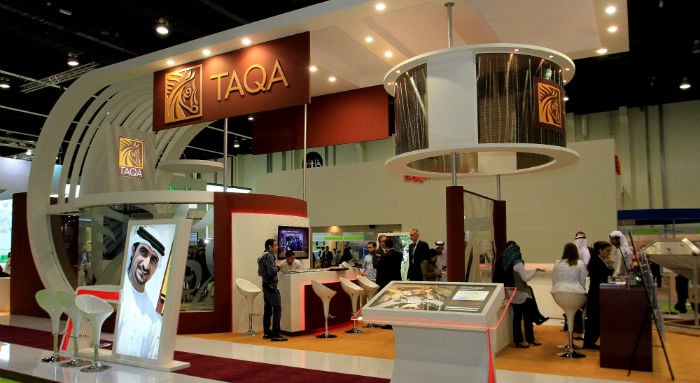Abu Dhabi considers state-backed merger for troubled TAQA – sources
Billions of dollars were spent on assets and expansion but the recent oil drop has impacted TAQA’s operations.

Abu Dhabi may merge its national energy company into another state-owned business to make the company’s crippling debts more manageable and try to turn around its performance, sources familiar with the matter told Reuters.
Founded in 2005 and the only listed quasi-sovereign company in the Gulf emirate, Abu Dhabi National Energy Company (TAQA) went on an expansion drive to create an energy giant to rival international oil majors such as Exxon and BP.
Billions of dollars were spent on assets, with Canada and the North Sea among its favoured destinations, in areas including oil and gas exploration, underground gas storage, power generation and water desalination.
But the last 18 months have seen its strategy fall apart, with the huge debts taken on to fund its expansion and a big drop in oil prices calling into question its very existence.
“The company is embroiled in a battle for its future,” said a source close to the company, declining to be named due to the matter’s sensitivity.
After plunging to a fourth-quarter loss of Dhs 3.6bn ($980 million), TAQA said it would slash capital spending by 39 per cent this year and make Dhs 1.5bn of cost savings over the next two years. It is also conducting a review of its assets ahead of potential sales.
Now, Blackstone has been hired to advise on ways to tackle its debt pile, according to the source, with total liabilities reaching some Dhs104.8bn ($28.5bn), according to its first-quarter financial statement.
Sources told Reuters last week that TAQA was raising a $3bn five-year loan aimed as consolidating multiple debts into a single, cheaper facility.
Taking a first step to improve its debt situation could open the way to a merger with another state-owned company.
“It is the biggest stumbling block so by reducing the debt, Abu Dhabi can do whatever it wants and fold it into any other entity,” said the source, adding merger considerations were still at any early stage.
Should a merger happen, shareholders owning the 27.8 per cent of TAQA not controlled by the government will hope it follows the smooth path of Aldar Properties’ share-swap merger with Sorouh Real Estate in 2013 — and not Aabar Investments’ takeover by International Petroleum Investment Company in 2010, which faced a backlash from minority shareholders after the initial offer was regarded as too low.
Monopoly utility Abu Dhabi Water and Electricity Authority (ADWEA) or Mubadala Petroleum, an arm of one of the emirate’s main investment funds, are the likely merger candidates, according to three Abu Dhabi-based sources.
ADWEA already owns 53.4 per cent of TAQA on behalf of the government and would be a good fit with TAQA’s power generation assets in the United Arab Emirates. Mubadala’s energy focus would also ensure synergies, the sources said.
TAQA declined to comment. A spokesman for Mubadala dismissed merger talk as rumours. ADWEA could not be reached for comment.
SUPPORT
TAQA has already received government help, including assets transferred to it and the conversion of a shareholder loan into equity, according to a Moody’s report in which it downgraded TAQA’s baseline credit assessment by three notches due to concerns over its debts.
Moody’s also assumed the government was behind a transaction disclosed in TAQA’s 2014 accounts where a “related party” agreed to purchase certain oil and gas assets.
“If the company had not entered into this transaction, they (TAQA) would have had to increase impairments by Dhs 6.6bn,” said Moody’s analyst Julien Haddad, adding if this sum was removed from TAQA’s equity position, which stood at Dhs 8.7bn at the end of 2014, it would have further eroded the capital base of a company “already thinly capitalised”.
Like energy companies globally, TAQA has been hit hard by the 45 per cent decline in the oil price since June 2014.
But its problems extend beyond the recent downturn, and have not been solved by multiple management changes.
Carl Sheldon stepped down in February 2014 as chief executive and Edward LaFehr, appointed chief operating officer at that time, has been in charge since then.
In April 2014, TAQA’s board was revamped with more than half replaced at the end of their three-year terms, while its finance chief left in September and no permanent replacement has been named.
“All they are doing is managing down the value of the company,” said one of the Abu Dhabi-based sources of the leadership situation.
One thing LaFehr has done is launch a review of the company’s assets, which is being undertaken by Macquarie and McKinsey & Co..
Sales are expected to centre on TAQA’s North American oil and gas business, although one of the sources said it would likely retain its 85 per cent interest in a tolling agreement for the Red Oak power plant in New Jersey, as well as its 50 per cent stake in Lakefield wind farm in Minnesota.
